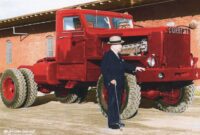Light Duty Flatbed Tow Trucks For Sale: Your Comprehensive Guide to Making the Right Purchase pickup.truckstrend.com
Introduction: The Versatility and Value of Light Duty Flatbed Tow Trucks
In the dynamic world of vehicle recovery, transport, and roadside assistance, the light duty flatbed tow truck stands as an indispensable workhorse. Far more than just a means to move disabled vehicles, these versatile machines are critical assets for towing companies, auto repair shops, dealerships, and even private individuals engaged in vehicle transport. A light duty flatbed is typically designed to transport vehicles up to 10,000-12,000 pounds Gross Vehicle Weight Rating (GVWR), encompassing most passenger cars, light trucks, SUVs, motorcycles, and even small equipment. Their primary advantage lies in their ability to load a vehicle completely onto a flat, stable platform, ensuring maximum safety, preventing mileage accumulation, and eliminating potential damage to the towed vehicle’s drivetrain or suspension. For anyone looking to expand their fleet, start a new towing business, or enhance their existing services, understanding the nuances of "Light Duty Flatbed Tow Trucks For Sale" is the first crucial step towards a successful investment.
Light Duty Flatbed Tow Trucks For Sale: Your Comprehensive Guide to Making the Right Purchase
What Defines a Light Duty Flatbed Tow Truck?
A light duty flatbed tow truck is characterized by its chassis, which typically ranges from Class 3 to Class 5 (e.g., Ford F-350/F-450/F-550, Ram 3500/4500/5500, Chevrolet Silverado 3500HD/4500HD/5500HD). These trucks are equipped with a hydraulic bed that can tilt and slide backward, allowing a vehicle to be winched onto its surface.
Key defining features include:
- Chassis Size: Built on commercial-grade light-to-medium duty truck chassis.
- GVWR: Generally falls within the 10,001 to 19,500 lbs range, suitable for common passenger vehicles.
- Flatbed Body: Available in various lengths (typically 19-22 feet) and materials (steel or aluminum). It features a robust subframe, a tilting mechanism, and a sliding function.
- Winch System: A powerful hydraulic winch, often with capacities ranging from 8,000 to 12,000 lbs, is mounted at the front of the bed for pulling vehicles onboard.
- Safety Features: Includes tie-down points, a sturdy headache rack (cab protector), and often an integrated or independent wheel lift at the rear for secondary towing or boosting capacity.
- Auxiliary Equipment: Storage toolboxes, warning light bars, work lights, and sometimes air compressors or jump-start capabilities.

These trucks are the backbone of many roadside assistance operations, offering a safe and efficient method for transporting vehicles that are disabled, involved in accidents, or require damage-free relocation.
Why Choose a Light Duty Flatbed? Benefits Explored

The decision to invest in a light duty flatbed tow truck comes with a host of compelling advantages:
- Unparalleled Versatility: Flatbeds can transport almost anything that fits on their deck – cars, motorcycles, ATVs, forklifts, small construction equipment, sheds, and even specialty vehicles. This broad capability translates directly into diverse revenue streams.
- Superior Vehicle Safety: By lifting the entire vehicle onto a flat platform, flatbeds eliminate wear and tear on the towed vehicle’s tires, suspension, and drivetrain. There’s no risk of damage from towing "on the hook" for extended distances, making them ideal for high-value, classic, or luxury cars.
- Efficiency in Operation: Modern hydraulic flatbeds allow for relatively quick loading and unloading. With practice, operators can secure a vehicle in minutes, minimizing roadside time and maximizing service calls per day.
- Damage Prevention: The full-deck transport method virtually eliminates the risk of bumper scrapes, undercarriage damage, or other issues commonly associated with traditional hook-and-chain or wheel-lift towing for certain vehicle types.
- Customer Preference: Many customers, especially those with newer or more expensive vehicles, specifically request flatbed towing due to its perceived safety and gentleness on their vehicle. Meeting this demand can enhance customer satisfaction and loyalty.
- Easier for Complex Recoveries: For vehicles with seized wheels, missing wheels, or significant damage, a flatbed often provides the safest and most straightforward recovery solution.

Key Considerations When Buying a Light Duty Flatbed Tow Truck
Purchasing a light duty flatbed is a significant investment that requires careful consideration. Here’s a guide to help you make an informed decision:
New vs. Used
- New Trucks: Offer the latest technology, full manufacturer warranties, and customization options. They come with peace of mind regarding maintenance history but at a higher initial cost. Ideal for long-term investments and businesses requiring maximum reliability.
- Used Trucks: Can be a cost-effective entry point, offering significant savings. However, they require thorough inspection, and their maintenance history is crucial. Ideal for startups or those with a limited budget, provided due diligence is performed.
Chassis & Powertrain
The foundation of your tow truck.
- Engine: Diesel engines (e.g., Ford Power Stroke, Ram Cummins, Chevy Duramax) are preferred for their torque, durability, and fuel efficiency under load, though gasoline options are available for lighter applications.
- Transmission: Look for heavy-duty automatic transmissions designed for commercial use.
- Single vs. Dual Rear Wheel (DRW): DRW chassis provides greater stability, higher payload capacity, and better traction, essential for towing heavy loads safely.
Flatbed Body Specifications
- Length: Common lengths are 19, 20, 21, and 22 feet. Longer beds accommodate larger vehicles but can be less maneuverable in tight spaces.
- Material:
- Steel: More durable, heavier, typically lower cost, and more resistant to impact.
- Aluminum: Lighter (improving fuel economy and payload capacity), corrosion-resistant, but more expensive and potentially more susceptible to certain types of damage.
- Tilt Angle: A lower tilt angle makes loading low-clearance vehicles easier.
- Clear Deck Space: Ensure the bed design doesn’t have unnecessary obstructions.
Winch Capacity & Type
- Capacity: Match the winch capacity (e.g., 8,000 lbs, 10,000 lbs, 12,000 lbs) to the heaviest vehicles you anticipate towing. Always err on the side of higher capacity.
- Type: Hydraulic winches are the industry standard for their power, reliability, and continuous duty cycle. Electric winches are less common for primary towing but might be seen on smaller or older units.
- Cable vs. Synthetic Rope: Steel cable is durable but heavy and can fray. Synthetic rope is lighter, safer (less recoil if it breaks), and easier to handle, but more susceptible to abrasion.
Additional Features & Accessories
- Wheel Lift: An independent or integrated wheel lift (often 3,500-5,000 lbs capacity) at the rear greatly enhances versatility, allowing for two-vehicle transport or traditional wheel-lift towing.
- Light Bars & Work Lights: Essential for visibility and safety, especially during night operations.
- Toolboxes: Ample, secure storage for chains, binders, straps, and recovery tools.
- Tie-Downs: Ensure a variety of secure tie-down points are available along the bed.
- Remote Controls: For winch and bed functions, improving safety and efficiency.
GVWR & Payload Capacity
Understand the truck’s Gross Vehicle Weight Rating (GVWR) and its actual payload capacity (GVWR minus the truck’s curb weight). This is critical to ensure you don’t overload the truck, which is illegal and unsafe. Always factor in the weight of the truck itself, the flatbed body, fuel, driver, and all equipment before considering the vehicle you plan to tow.
Maintenance & Service Records (for Used Trucks)
For used trucks, a complete service history is invaluable. It indicates how well the truck was maintained and can flag potential recurring issues. Look for evidence of regular oil changes, transmission services, brake replacements, and hydraulic system checks.
Budget & Financing
Beyond the purchase price, consider operating costs (fuel, insurance, maintenance) and potential financing options. Many commercial lenders specialize in equipment financing for tow trucks.
Where to Find Light Duty Flatbed Tow Trucks For Sale
The market for light duty flatbed tow trucks is robust, offering several avenues for potential buyers:
- Authorized Dealerships: New tow trucks are primarily sold through authorized dealers specializing in commercial vehicles and tow truck bodies. They offer new models, warranties, and often financing. Some also sell certified used trucks.
- Specialized Tow Truck Dealers: These dealerships focus exclusively on new and used tow trucks of all types. They often have a wide inventory, experienced sales staff, and maintenance facilities.
- Online Marketplaces:
- Commercial Truck Trader, TruckPaper.com: Leading platforms specifically for commercial vehicles, offering a vast selection of new and used tow trucks from dealers and private sellers nationwide.
- eBay Motors, Craigslist: Can be sources for private sales, often at lower prices, but require more caution and due diligence.
- Auctions:
- Public Auctions: Government surplus, repossessions, and fleet liquidation auctions can offer good deals, but "as-is" sales mean higher risk.
- Specialized Equipment Auctions: Some auction houses focus on heavy equipment and commercial vehicles.
- Direct from Owner/Private Sales: Check local classifieds or network within the towing industry. Buying directly can sometimes yield better prices by cutting out dealer markups, but it means no warranties and requires more thorough personal inspection.
- Tow Truck Brokers: Professionals who connect buyers with sellers, often having access to trucks not publicly advertised.
Tips for a Successful Purchase
- Define Your Needs Clearly: Before you start looking, list the types of vehicles you’ll primarily be towing, your budget, desired features, and operational environment. This will narrow down your options.
- Set a Realistic Budget: Include not just the purchase price, but also taxes, registration, insurance, initial maintenance, and any necessary upgrades.
- Thorough Inspection (Pre-Purchase Inspection): For used trucks, this is non-negotiable. Hire an independent, qualified mechanic specializing in commercial vehicles or tow trucks to perform a comprehensive inspection. Check the engine, transmission, brakes, tires, suspension, hydraulic system, winch, and the flatbed structure itself for cracks, rust, or damage.
- Test Drive: Always test drive the truck under various conditions. Pay attention to steering, braking, acceleration, and any unusual noises. Test all tow equipment functions (bed tilt, slide, winch).
- Review Documentation: Verify the title is clear, check for liens, and review all available maintenance records. For new trucks, understand the warranty terms.
- Negotiate: Don’t be afraid to negotiate the price, especially for used trucks. Research market values beforehand.
- Understand "As-Is": Most used commercial vehicles are sold "as-is, where-is" with no warranty. Be fully aware of what you’re buying.
Potential Challenges and Solutions
- Finding the Right Specs: The sheer variety can be overwhelming. Solution: Prioritize your core needs (payload, bed length, winch capacity) and be willing to compromise on secondary features. Consult with experienced operators or dealers.
- Budget Constraints: New trucks are expensive, and even used ones can be a significant investment. Solution: Explore financing options, consider well-maintained used trucks, or look into leasing if ownership isn’t essential initially.
- Condition of Used Trucks: Hidden problems can quickly turn a "deal" into a money pit. Solution: Always get a professional pre-purchase inspection. Be wary of trucks with heavily patched frames or extensive rust.
- Financing: Securing commercial vehicle financing can be complex, especially for new businesses. Solution: Prepare a solid business plan, maintain good credit, and work with lenders experienced in the towing industry.
- Post-Purchase Maintenance: Tow trucks endure heavy use and require specialized maintenance. Solution: Factor ongoing maintenance costs into your budget. Establish a relationship with a reliable heavy-duty mechanic.
Light Duty Flatbed Tow Trucks Estimated Price Guide
Please note: Prices are highly variable based on condition, mileage, year, make, model, features, and market demand. These are estimates for general guidance.
| Category | Chassis Make/Model (Examples) | Flatbed Type/Length (Examples) | Key Features (Examples) | Estimated Price Range (USD) |
|---|---|---|---|---|
| New | Ford F-450/F-550, Ram 4500/5500, Chevy 4500HD/5500HD | Steel or Aluminum, 19-22 ft | New engine, full warranty, hydraulic winch (10-12k lbs), LED lights, toolboxes, often includes wheel lift | $90,000 – $160,000+ |
| Used (Excellent Condition) | Ford F-450/F-550, Ram 4500/5500 (2-5 years old, low mileage) | Steel or Aluminum, 19-22 ft | Well-maintained, recent service, strong engine/trans, working hydraulics, minor wear & tear | $60,000 – $90,000 |
| Used (Good Condition) | Ford F-350/F-450, Ram 3500/4500 (5-10 years old, moderate mileage) | Steel or Aluminum, 19-21 ft | Functional, may have cosmetic wear, routine maintenance records, could need minor repairs | $35,000 – $60,000 |
| Used (Fair/Budget) | Various makes (10+ years old, high mileage) | Steel, 18-20 ft | Operational, but likely needs significant maintenance, cosmetic issues, "as-is" sale | $15,000 – $35,000 |
Prices do not include taxes, registration, or additional fees.
Frequently Asked Questions (FAQ)
Q1: What is the typical lifespan of a light duty flatbed tow truck?
A1: With proper maintenance, the chassis can last 300,000 to 500,000 miles or more, while the flatbed body and hydraulic system can last 15-20+ years. Regular servicing and proactive repairs are key.
Q2: Can a light duty flatbed tow truck handle heavy-duty towing?
A2: No. Light duty flatbeds are designed for vehicles up to their rated GVWR (typically 10,000-12,000 lbs towed weight). Attempting to tow heavy-duty vehicles (e.g., semi-trucks, buses) can damage the truck, invalidate warranties, and is extremely unsafe. Always match the truck’s capacity to the load.
Q3: What’s the main difference between steel and aluminum flatbeds?
A3: Steel beds are heavier, more durable against impact, and generally less expensive. Aluminum beds are lighter, which improves fuel efficiency and allows for a higher payload capacity on the same chassis. Aluminum is also corrosion-resistant but typically costs more upfront.
Q4: Is financing available for these trucks?
A4: Yes, various financing options are available. Many commercial lenders, banks, and even tow truck dealerships offer specialized financing for new and used tow trucks. Loan terms and interest rates will depend on your creditworthiness and business history.
Q5: What permits or licenses do I need to operate a light duty flatbed tow truck?
A5: Requirements vary by state and locality. Generally, you’ll need a commercial driver’s license (CDL) if the truck’s GVWR or Gross Combination Weight Rating (GCWR) exceeds certain thresholds (e.g., 26,001 lbs). You’ll also need proper business licensing, commercial vehicle insurance, and potentially specific towing permits or certifications for your operating area. Always check local and state regulations.
Q6: How often should a flatbed tow truck be serviced?
A6: Service intervals depend on usage and manufacturer recommendations. Generally, routine maintenance (oil changes, fluid checks) should occur every 5,000-10,000 miles or as per the chassis manufacturer. Hydraulic systems, winches, and the flatbed mechanism should be inspected regularly (e.g., every 3-6 months) by a specialized technician.
Concluding Summary
Investing in a light duty flatbed tow truck is a strategic decision that can significantly enhance the capabilities and profitability of any vehicle-related business. Their unparalleled versatility, commitment to vehicle safety, and operational efficiency make them a preferred choice for a wide range of towing and transport needs. By carefully considering factors such as new vs. used, chassis specifications, bed materials, winch capacity, and essential features, buyers can make an informed choice that aligns with their operational demands and budget. Remember to conduct thorough inspections, understand all costs, and ensure proper licensing and insurance. With the right light duty flatbed, you’re not just buying a truck; you’re investing in a reliable partner that will serve your business for years to come.



